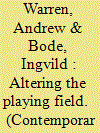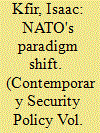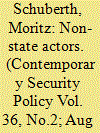|
|
|
Sort Order |
|
|
|
Items / Page
|
|
|
|
|
|
|
| Srl | Item |
| 1 |
ID:
140335


|
|
|
|
|
| Summary/Abstract |
This article will interrogate the degree to which the Obama administration has continued, even at times inadvertently, the Bush administration's challenge on international law. Notwithstanding the Obama administration's bold pronouncements pertaining to reversing its predecessor's policies, little has actually changed when it comes to how the USA considers using military force. As a means to unpack this transition, this article will firstly consider the apparent continuum of use-of-force policies from the Bush to the Obama administration, specifically: the American conflation in the line between pre-emptive and preventive self-defence options; the sustained post-September 11 legacies that continue to lower thresholds towards using military force; and how this ultimately contributes to the erosion of international law in this area. Secondly, this article presents a critical contextualization of Obama's drone programme and its legal arguments in relation to his administration's overall use-of-force policy, focusing on jus ad bellum standards. In light of the centrality of targeted killings under Obama, our article will pay particular attention to the contradiction this poses with regard to his reluctance to use military force in relation to ongoing conflicts in Libya and Syria, while also looking at recent adjustments pertaining to use-of-force pronouncements against the Islamic State (IS). The article lastly considers what this will mean for international use-of-force thresholds and the future of the general prohibition on the use-of-force in the context of new and emerging technologies and theaters should the USA continue to skew and adjust its use-of-force policies on when, how, against who and where to use such force.
|
|
|
|
|
|
|
|
|
|
|
|
|
|
|
|
| 2 |
ID:
140338


|
|
|
|
|
| Summary/Abstract |
In December 2014, the European Union (EU) launched its civilian mission in Ukraine, EU Advisory Mission (EUAM). Although the mission's main purpose is to mentor and advice Ukrainian officials on civilian Security Sector Reform, this article argues that EUAM's deployment was driven by a broader geopolitical logic, that is, to soft balance Russia. Following Russia's annexation of Crimea in March 2014, international perceptions of Moscow's intentions turned increasingly ambivalent. Due to EU member states’ divergent interests vis-à-vis Russia and the union's lack of hard balancing capabilities, the only feasible means available to the EU to deal with the situation in Ukraine were diplomatic and economic pressure, that is, sanctions. However, whereas sanctions are designed to compel Russia to solve her ongoing conflict with Ukraine diplomatically, the EU is also undertaking soft balancing measures that allow it to undermine Russia's interests in Ukraine without confronting her directly. Two attributes make EUAM a soft balancing act: firstly, it improves the resilience of the Ukrainian state against Russian influence and pressure; and secondly, it shows political support to the Ukrainian government and people. There currently is a broad consensus among EU member states for supporting Ukraine in almost every way, short of military assistance. Whether or not this support is sustainable in the long run is an open question.
|
|
|
|
|
|
|
|
|
|
|
|
|
|
|
|
| 3 |
ID:
140337


|
|
|
|
|
| Summary/Abstract |
Although recent years have seen more talk about Article 5 and the need for NATO to stand up to an expansive Russia, NATO states are unlikely to engage in a new Cold War with Russia. Instead the alliance continues to explore its agenda in the post-Afghanistan and post-Crimea period. One answer to these tensions is to develop an agenda stressing human security to counter the pervasive threats of regional instability and terrorism. After reviewing the alliance's Military Concept Against Terrorism (MCAT), the deliberations of the 2012 Chicago and 2014 Wales Summits, and the European Union's Common Defence and Security Policy (CSDP), this article explores two propositions. First, that the vacillating commitment of alliance members who chose to address security issues through EU mechanisms or optional coalitions of the willing threatens NATO's relevance. If NATO's members are unclear about the alliance's agenda and identity, others cannot know what the alliance is willing to do to protect its interests. Second, by developing Military Concept against Terrorism and Smart Defence along a human security framework coupled with maritime operations would enable the alliance to better satisfy the needs of its European members, allowing them to employ NATO to support the EU's Common Defence and Security Policy, and ensure a continued reliance on NATO. As one area where there is a consensus between NATO's European members and the USA, counterterrorism is the most promising field that the alliance can focus on. NATO, therefore, should position itself as a key counterterrorism force, albeit one that is not strictly kinetic.
|
|
|
|
|
|
|
|
|
|
|
|
|
|
|
|
| 4 |
ID:
140339


|
|
|
|
|
| Summary/Abstract |
This article engages with peace and security in Africa. Peace and security policy constitutes the main focus of cooperation between the European Union and the African Union under the 2007 Joint Africa–European Union Strategy and the current Roadmap 2014–2017. Peace and security is a major topic because, according to the Conflict Barometer 2014, Africa remains the most conflict-prone continent in the world. In the past two decades, various actors, including the United Nations, Africa's Regional Economic Communities, the European Union, ad hoc coalitions and individual states have launched a large number of peacekeeping operations in Africa. Despite some successes, there have also been significant failures and challenges. Consequently, there is an ongoing debate about peacekeeping in Africa and the participation of the European Union in supporting such operations. While the ‘African solutions to African problems’ agenda emerged in the early 2000s out of the perceived failures of the 1990s, the African Union has not, however, always lived up to the hopes. Subsequently, the United Nations has continued to play a major role in peacekeeping in Africa. In fact, the existing literature has neglected the important role of the United Nations with regard to European Union–African Union cooperation in general, including in the area of peace and security. A lot of the issues addressed in the Joint Africa–European Union Strategy, including its focus on peace and security, are related to the United Nation's agenda. Hence, this article will also demonstrate that, due to the major role played by the United Nations in European Union–African Union peacekeeping activities, making it without doubt an inseparable part of the European Union–African Union partnership, it is more appropriate to speak of an African Union–European Union–United Nations nexus. Last but not least, important lessons for regional, interregional and multilateral cooperation can be deduced from this innovative African Union–European Union–United Nations nexus. These include the need for the three actors to play to their strengths, making important and specific contributions, which, when combined, complement those of their partner institutions.
|
|
|
|
|
|
|
|
|
|
|
|
|
|
|
|
| 5 |
ID:
140336


|
|
|
|
|
| Summary/Abstract |
North Atlantic Treaty Organization's (NATO) engagement in Afghanistan represents the most challenging operation in alliance history. Although after 14 years of international intervention the political and socio-economic conditions in Afghanistan have improved, the ongoing withdrawal of international troops is not leaving the country with clear prospects of stability. A vast literature examines the alliance in Afghanistan. An especially relevant important part deals with the USA and NATO mistakes, lessons learned or assessment of the current situation. The origins of NATO's difficulties in Afghanistan are less systematically explored. The consequences of NATO inheriting an ongoing intervention, what it inherited, and the ultimate implications of the distinction between the ‘American war’ and the allied mission remained partially overlooked and obscure. A comprehensive understanding of the origins of what went wrong in allied involvement in Afghanistan is paramount to making sense of the alliance's role today and in the future. This article examines the origins of what NATO inherited in 2003, particularly in the light of the re-Americanization of the conflict during the Obama administration. This analysis focuses on: the consequences of the initial lack of distinction between the Taliban and al-Qaeda; the problems of coordination and competing visions between Enduring Freedom and the International Security Assistance Force; the ideological side of the war on terror which complicated the regional context; and the limited results Obama's strategy achieved. Focusing on the origins of the problems the alliance faces in Afghanistan permits better appreciation of the uniqueness of NATO's intervention and the challenge required to avert the double risk of overestimating or underestimating NATO's actual role in Afghanistan and its implications for the alliance's
|
|
|
|
|
|
|
|
|
|
|
|
|
|
|
|
| 6 |
ID:
140340


|
|
|
|
|
| Summary/Abstract |
The proliferation of irregular armed actors which defy simplistic definition has caught public and academic attention alike, not least in the pages of this journal. To move the debate on non-state armed groups (NSAGs) forward, this article seeks to enhance our conceptual understanding of parochial armed groups which are not primarily driven by ideological or religious objectives. Thus, this article clarifies similarities as well as differences between subtypes of community-based armed groups (CBAGs) on the one hand, and between CBAGs and other NSAGs, on the other hand. By doing so, a typology is developed that classifies militias, gangs and vigilantes on the basis of their political, economic and security-related dimensions. The resulting ideal types are discussed through the lenses of different explanatory frameworks and policy debates in the field of contemporary security studies. A major typological issue is the tendency for CBAGs to ‘turn bad’ and become threats to the stability they were expected to transform, becoming a serious problem in countries where they operate. It is concluded that the challenge of CBAGs ultimately needs to be addressed by putting in place a functioning state that can tackle the underlying woes that led to their proliferation in the first place.
|
|
|
|
|
|
|
|
|
|
|
|
|
|
|
|
| 7 |
ID:
140342


|
|
|
|
|
| Summary/Abstract |
This article focuses on the ability of militarily aligned small states to function as norm entrepreneurs to increase their own state interests. The scholarship on small state foreign policy is growing. This article builds on that scholarship by focusing on the promising, yet underdeveloped field of norm building. While small state scholars have researched norm-building capabilities in non-aligned states, research has not been done on the ability of aligned small states to build norms. Since the end of the Cold War, more and more small states are turning away from neutrality in favour of security organizations, NATO in particular. This has created a significant gap in the literature of small states that this article will address. Using Estonia's efforts at establishing norms in cybersecurity as a case study, this article analyses whether Estonia's membership in NATO helps or hinders its efforts in norm building. The research shows that NATO membership has helped Estonia's efforts in promoting norms, but also has limitations. Despite those limitations, this research shows that for small states with big ideas, the promotion of norms can be a powerful means to further state interest on the global level.
|
|
|
|
|
|
|
|
|
|
|
|
|
|
|
|
| 8 |
ID:
140341


|
|
|
|
|
| Summary/Abstract |
More than 15 years ago a new debate was opened discussing an emerging phenomenon: Private Military and Security Companies (PMSCs) in and around conflict zones. Initially focused on the actions of a number of notorious companies, the field matured rapidly and created a lively debate on how to accommodate these actors in military and democratic institutions. This article has two purposes. First, it offers an appraisal of the literature, and past research priorities (which questions were asked, and which fields/cases received most attention?). Second, it offers a critical reflection on the state-of-the-art, and argues that the strong preference for studying regulation, control, and accountability, and PMSCs working for the USA and UK, has limited our understanding of the scope of the phenomenon, its antecedents, and the implications beyond those directly related to regulation and control. Highlighting a recent, critical wave of scholarship I discuss the headway that can be made by studying: the commercialization of defence beyond the usual suspects; outsourcing in conflict zones beyond the nation-state; and questions beyond those directly related to regulation, control, and accountability.
|
|
|
|
|
|
|
|
|
|
|
|
|
|
|
|
|
|
|
|
|